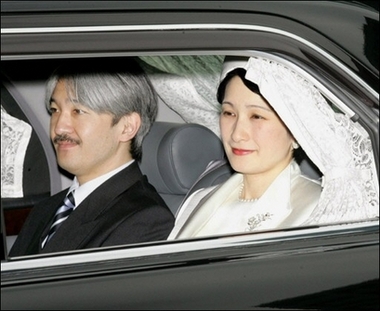TOKYO - Ordinary Japanese couples find it hard enough to choose a name for a
baby -- there are 2,928 permitted Chinese characters that can stand alone or be
combined with others for shades of meaning.

This photo, taken last
month, shows Japanese Prince Akishino (L) and his wife Princess Kiko
entering the Imperial Palace in Tokyo to meet with Emperor Akihito and
Empress Michiko. Japan is holding its breath for this week's royal birth,
hoping Princess Kiko will bear the family's first male heir in four
decades and ease a succession crisis in the widely revered
monarchy.[AFP\File] |
For Prince Akishino, who may find himself choosing a name for a future
emperor, the task will likely be even harder and must be completed within a
week.
His wife, Princess Kiko, is due to give birth to a baby by a Caesarean
operation on Wednesday, and if it is a boy he will be the first male born into
the imperial household in more than 40 years. Only males are allowed to succeed
to the throne under current law.
Since Akishino is a second son rather than a direct heir to the Chrysanthemum
throne he is permitted to name his own children rather than leaving the process
up to his father, Emperor Akihito.
The couple's two older daughters -- Princesses Mako and Kako -- were given
two-syllable names to echo their mother's monicker, the weekly Shukan Bunshun
said in its latest edition.
The new baby will likely also be given a name composed of two characters,
said Yasuo Ohara, a classics professor at Kokugakuin University in Tokyo.
Emperors' names traditionally end with the character "hito," meaning the
highest moral standard, while names for royal women end in "ko", meaning
noblewoman.
Names ending in "hito" are highly unusual for commoners and while "ko" was
once a popular name ending for girls, it is increasingly rare for new babies.
Akishino's given name is Fumihito, his elder brother is Crown Prince Naruhito
and their grandfather was the wartime Emperor Hirohito.
In a simple naming ceremony held seven days after the birth of Kako, Akishino
laid a wooden box on the baby's pillow, containing her name written on a piece
of "washi" handmade paper, the Shukan Bunshun said.
Although the government's list of approved characters for names does not
strictly apply to the royal family, Akishino is unlikely to choose anything too
esoteric.
"He probably won't choose anything complicated, or that would be difficult
for the public to feel familiar with," said Ohara. "That has been the custom
since the Meiji period (1868-1912)," he added.
Whatever name finds its way into the wooden box next week could influence a
generation of Japanese children.
When Naruhito was born in 1960 he was also given the childhood title Prince
Hiro. That year, four names using the character for "hiro" made it on to the top
10 list of boys' names, with "Hiroshi" the most popular.
Following the birth of Naruhito's only daughter Princess Aiko in 2001, the
character "ai" -- meaning love -- became a popular choice for girls' names,
according to Meiji Yasuda Life, which conducts a survey among its policyholders
every year.